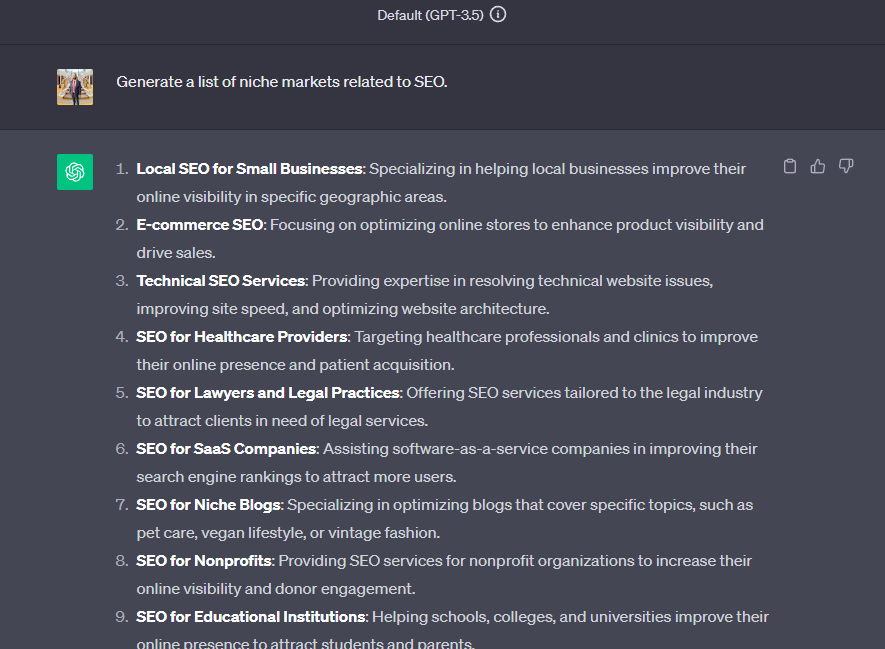You’ve heard it before: “Find your passion and you’ll never work a day in your life.” But let’s be real, passion doesn’t always pay the bills. What if I told you that finding your niche could ignite your passion and turn it into a profitable venture? Intrigued? Let’s dive in.
Quick Overview
Finding a profitable niche is a multi-step process that involves market research, competitor analysis, and content strategy. ChatGPT can serve as a comprehensive guide through these steps, offering valuable insights and actionable advice.

Why Go Niche?
Before we delve into the nitty-gritty, it’s crucial to understand how the landscape has evolved. In the past, entrepreneurs often went broad, targeting large markets. However, the trend has shifted towards specialization, allowing for a more focused and effective approach.
Preparing and Adapting: Your Action Plan
- Market Research: Use tools like Google Trends to identify emerging niches.
- Competitor Analysis: Understand what others in your niche are doing right and wrong.
- Content Strategy: Create valuable content that addresses specific problems in your niche.
- SEO Optimization: Use keyword research tools to optimize your content for search engines.
- Leverage ChatGPT: Utilize AI tools like ChatGPT for customer service, content creation, and data analysis.
Future-Proofing Your Niche Business
- Continuous Learning: Stay updated with industry trends.
- Community Building: Establish a loyal customer base.
- Diversification: Don’t put all your eggs in one basket; diversify your product or service offerings.
- Sustainability: Focus on long-term solutions rather than quick fixes.
A Step-by-Step Guide to Finding Your Niche
Finding your profitable niche can feel like looking for a needle in a haystack, but it doesn’t have to be that complicated. Here’s a step-by-step guide to help you identify your niche using a proven method.
Start with Broad Market Categories
Begin by listing broad market categories that interest you or have a high demand. These could range from health and wellness to technology to home improvement.
Conduct Keyword Research

Use keyword research tools like Google Keyword Planner or SEMrush to find specific terms people are searching for within those broad categories. This will give you an idea of the sub-niches that exist.
Analyze the Competition
Once you’ve narrowed down to a few potential niches, it’s time to scope out the competition. Use tools like Moz or Ahrefs to see how many businesses are targeting the same keywords and what kind of content they’re producing.
Validate Demand
Check platforms like Amazon, eBay, or Etsy to see if products in your chosen niche are selling well. High sales are a good indicator of demand.
Assess Profitability
Look at the average price point of these products and consider the potential for markup. Also, check if there are affiliate programs you can join to add revenue stream.

Leverage ChatGPT for Validation
Use ChatGPT to conduct market surveys or analyze customer reviews in your chosen niche. This can provide valuable insights into what your target audience is looking for.
Test the Waters
Before going all-in, consider running a small-scale test. This could be a minimal viable product (MVP) or a few blog posts to gauge interest.

Refine and Pivot
Based on the feedback and data you gather, you may need to refine your niche or pivot to a slightly different focus.
Finding Your Niche with ChatGPT: A Comprehensive Guide Including Competitor Analysis
Whether you’re on the free version of ChatGPT 3 or the feature-rich ChatGPT 4, you can use this tool to not only find but also validate your profitable niche. Here’s a step-by-step guide that includes instructions for conducting competitor analysis.
For ChatGPT 3 Users
Step 1: Generate Niche Ideas
Ask ChatGPT to generate a list of niche markets based on your interests or trending topics. Type, “Generate a list of niche markets related to [your interest].”

Step 2: Validate Ideas
Request pros and cons for each niche idea by asking, “Tell me the pros and cons of starting a business in the [chosen niche].”
Step 3: Keyword Suggestions
Ask for keyword suggestions by typing, “Suggest some keywords for [chosen niche].”

Step 4: Content Ideas
Request content ideas that would attract your target audience, such as “Give me some blog post ideas for [chosen niche].”

Step 5: Competitor Analysis
While ChatGPT 3 can’t browse the web, you can manually search for top competitors in your niche and then ask ChatGPT how to differentiate your business.
For ChatGPT 4 Users with Plugins
Step 1: Generate Niche Ideas
Start by generating a list of niche markets, similar to ChatGPT 3.
Step 2: Conduct Market Research
Use the browsing capabilities to look up market trends, competitor analysis, or customer reviews related to your chosen niche.
Step 3: Validate with Real-Time Data
Leverage plugins to pull in real-time data, such as current sales figures or the latest news affecting the market.
Step 4: Content Strategy
Ask ChatGPT to outline a full content strategy with keyword research and SEO recommendations.
Step 5: Competitor Analysis
Use the search function to find competing sites in your chosen niche. Once you have this information, ask ChatGPT to analyze the top-performing content topics and how to create better content.
Step 6: Leverage ChatGPT for Customer Insights

Use ChatGPT to analyze customer reviews, social media mentions, or even conduct surveys to validate your niche choice further.
By following these steps, you’ll identify a profitable niche and understand the competitive landscape and how to position yourself for success.
Competitor Analysis: Know Your Rivals to Rise Above Them
Whether you plan to start a website, blog, YouTube channel, TikTok, Pinterest, or any other platform, choosing a profitable niche is the first step. The next crucial phase is understanding your competition. Here’s how to go about it:
Identify Top Competitors
Use search engines or specialized tools to find your chosen niche’s top-performing sites or channels. Look for those that consistently rank high and have a strong following.

Analyze Their Content
Check out the kind of content they’re producing. Is it blog posts, videos, infographics, or a mix? Take note of the topics they cover and the depth of their content.
Assess Engagement
Look at the number of likes, shares, comments, and other engagement metrics. This will give you an idea of what resonates with the audience in your niche.
Spot Gaps and Opportunities
Identify what your competitors are missing or not doing well. These gaps are your opportunities to shine.

Content Strategy: Crafting Content That Converts
Once you’ve got a handle on your competition, it’s time to craft a killer content strategy.
Define Your Unique Selling Proposition (USP)
What sets you apart from the competition? Your USP should be the cornerstone of your content strategy.
Plan Content Types
Decide on the types of content you’ll produce. Will it be articles, videos, podcasts, or a combination?
Create a Content Calendar
Plan your content. Ensure to include a mix of evergreen content and timely pieces that capitalize on current trends or seasons.
Measure and Tweak
Regularly review your analytics to see what’s working and what’s not. Be prepared to tweak your strategy as needed.

SEO Optimization: The Lifeline of Your Online Presence
SEO isn’t just for websites; it’s crucial for any online platform where you want to attract organic traffic.
Keyword Research
Identify the keywords relevant to your niche that you can realistically rank for.
On-Page SEO
Make sure your content is optimized for your target keywords. This includes meta descriptions, headers, and the content itself.
Off-Page SEO
Build quality backlinks to your content. This boosts your SEO and establishes your authority in the niche.

Monitor and Update
SEO is a long-term game. Keep an eye on your rankings and be ready to update your content and strategy as algorithms change.
Remember, regardless of the platform you choose, these steps are universal. They will help you not only find but also dominate your profitable niche.

Validating Your Niche Idea: Start Small, Then Scale
You’ve pinpointed a promising niche, but how can you be sure it’s right for you? The key is to start small, invest a modest amount of time, and then scale up if you see potential. Here’s how to validate your niche idea without going all in right away:
Dip Your Toes with Market Research
Use tools like Google Trends or industry-specific reports to gauge interest and demand in your chosen niche. This initial step requires minimal time investment.

Create a Small Content Sample
Start by creating a small content sample instead of launching a full-fledged website or channel. This could be a couple of blog posts, a short video series, or social media posts targeted at your niche.
Engage with Your Target Audience
Use social media or online forums to interact with potential customers. Ask questions, run polls, or share snippets of your content to gauge interest and gather feedback.
Analyze Competitors on a Smaller Scale
Instead of a deep dive into competitor analysis, take a quick look at what others in your niche are doing. Identify gaps or unique angles they haven’t covered.

Commit Limited Time Initially
Set aside a specific, manageable amount of weekly time to work on your niche project. Track your progress and any engagement you receive.
Financial Feasibility Check
Do a quick calculation of any minimal costs involved, like domain registration or social media ads, and compare this with any income or leads generated during your trial period.
Consult Within Your Network
Talk to friends, family, or colleagues familiar with your niche. Their feedback can offer valuable insights without requiring a significant time investment.
Run a Mini Marketing Campaign
Invest in a small, targeted marketing campaign. Use the data to measure its effectiveness in engagement, lead generation, and potential for conversion.
If the signs are positive and you’re gaining traction, that’s your cue to scale up and commit more resources to your niche venture.
FAQs on Finding Your Profitable Niche with ChatGPT
How can ChatGPT help me find a profitable niche?
ChatGPT can assist in brainstorming ideas, analyzing market trends, and even drafting initial content, making it a versatile tool in niche discovery.
Is ChatGPT effective for keyword research?
While ChatGPT doesn’t perform keyword research, it can guide you on how to do it effectively, offering tips and strategies.
Can I use ChatGPT for competitor analysis?
Yes, ChatGPT can help outline the steps for a thorough competitor analysis, although you’ll need to gather the data yourself.
How reliable is ChatGPT for market research?
ChatGPT can provide a framework for conducting market research but doesn’t replace dedicated research tools. It’s best used as a supplementary resource.
Can ChatGPT help me if I’m a complete beginner?
ChatGPT can guide beginners through the complexities of finding a profitable niche, breaking down each step for easier understanding.
What if I don’t have the paid version of ChatGPT?
Even the free version of ChatGPT can offer valuable insights and guidance, although you’ll miss out on some advanced features like plugins.
How can ChatGPT assist in content creation for my niche?
ChatGPT can help draft sample content, generate content ideas, and even assist in creating a content calendar for your chosen niche.
Is ChatGPT useful for social media engagement in my niche?
Yes, ChatGPT can help you draft social media posts, responses, and engagement strategies tailored to your niche.
Can ChatGPT help me identify gaps in the market?
While it can’t provide real-time data, ChatGPT can guide you on identifying market gaps through research and analysis.
How do I use ChatGPT to validate my niche idea?
ChatGPT can outline the steps for validation, from conducting surveys to running mini marketing campaigns, helping you make data-driven decisions.
Bottom Line
Leveraging ChatGPT to find a profitable niche can be a game-changer. This tool can be your all-in-one assistant, from brainstorming and research to content creation and validation. Whether you’re a beginner or seasoned entrepreneur, ChatGPT offers a streamlined approach to niche discovery.
